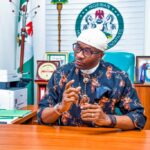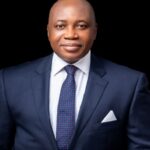The Central Bank of Nigeria (CBN), deploying various reform measures, has curtailed the once-wide gap between the official and parallel market rates, curbed speculative arbitrage in the nation’s foreign exchange (FX) market, writes JOSEPH INOKOTONG
The Central Bank of Nigeria (CBN) has activated market-driven pricing for the naira, significantly enhancing transparency and restoring investor confidence. With disciplined reforms and policy clarity, the naira has stabilized at a more sustainable level against the U.S. dollar. The once-wide gap between the official and parallel market rates has all but disappeared, a first in Nigeria’s recent history, and speculative arbitrage has all but vanished.
The battle to close the gap between the official market rates and parallel market rates has been raging for decades, with little to show for it. That was until the CBN-led reforms started and closed the huge gaps between both markets. For instance, while the naira exchanges at N1,599/$1 at the official window, the local currency exchanges at N1,600/$1, representing a meagre N1 gap between both rates.
Speaking on the development, CBN Governor, Olayemi Cardoso, said the renewed stability in the exchange rate has restored confidence in the market and spurred autonomous forex flows to the economy through formal channels. According to him, the forex inflows are diversifying Nigeria’s forex sources beyond oil, with large funds coming from diaspora remittances and export proceeds.
The stability in exchange rate has been applauded by market watchers, including the now popular Fitch Ratings, which upgraded Nigeria’s ratings, citing the exchange rate unification to reduce arbitrage in the markets, introduction of electronic FX matching platform and a new FX auction system. The monetary policy tightening to keep inflation in check.
Cardoso said, “The numbers speak for themselves. The difficult reforms that were initially a tough call to be taken by the orthodox monetary policy are a route we can’t compromise on. For adopting orthodox monetary policy, we have been able to stabilise the naira and restore the confidence of the economy.”
He said that the apex bank has strengthened its external buffers and positioned Nigeria to better withstand external shocks. Continuing, “Indeed the macroeconomic stability we are beginning to see today would not have been possible without these decisive actions. Nigeria’s external buffers have strengthened to the extent our foreign reserves now stand at close $34 billion, from declining reserves of about $32 billion. This robust buffer enables us to better monitor the interest of shocks – whether from declining oil prices or global financial turbulence – thereby safeguarding the value of the naira.”
Read Also: Oladoja vows to revamp NANS
He said the country currently holds its strongest external reserves, with a balance of payments surplus of $3.61 billion, the strongest since 2019. “Our trade balance has also improved significantly due to a notable increase in exports, particularly of oil and agricultural products. These factors have significantly contributed to the recent stability in the exchange rate and overall economic environment,” he said.
“We are beginning to see improvements in the current account position, reflecting a surplus in the balance of payments and an increase in capital inflows. These improvements are expected to support the naira and reduce the need for central bank intervention in the foreign exchange market,” Cardoso added.
Cardoso explained that this is a period of heightened uncertainty globally, and hence, a time for tough decisions. “In the midst of these challenges, there has been a lot the economy has had to go through, but we are also seeing that the economy is emerging stronger and more resilient. We have moved from a period of extreme vulnerability brought on by compound shocks, and now on the course of rebuilding confidence in our FX market, driven by reform momentum. We will continue to stay on the path of reform to fully reap the benefits and build our gains in stability and resilience.”
Wooing global investors for growth
Speaking during just concluded Spring Meetings of the IMF/World Bank Group in Washington, DC, at the Nigeria Investor Forum organised by JP Morgan in Washington DC, Cardoso said the adoption of orthodox monetary policy will be sustained, because it has helped the economy to navigate a difficult path to a point of stability. He said the foreign investors have seen these developments and raised their investments and commitments in the domestic economy. He spoke about recommitments to investment flows and closing the gaps in the exchange rate. He said the apex bank reached out to the diaspora communities, who are showing more commitments to investing in the economy.
Cardoso explained that this is a period of heightened uncertainty globally, but he has been able to, in the midst, during his short tenure, steer again back to the path of progress, even through the difficult things the CBN has done. He said that in spite of the challenges, the economy is navigating through a difficult path, but one that is now becoming clearly stable and that all investors need to be on, and when they invest, it becomes profitable in the long run.
He also said that Nigeria’s external reserves are robust and can withstand global economic shocks. In addition, a report released by the Nigerian Economic Summit Group (NESG) showed that Nigeria recorded a significant increase in foreign portfolio investment, marking a further step in its CEO’s strategy to strengthen its presence on the African continent.
Present in Lagos since the 1980s, US bank JP Morgan plans to transform its Nigerian representative office into a fully-fledged branch. “The New York-based financial institution, managed in Nigeria by Dapo Olagunju, will apply to the Central Bank of Nigeria, CBN, for a merchant banking licence in the coming months,” the report said.
If successful, this new US-Nigeria entity will be able to offer Nigerian-based large companies in addition to its advisory and asset management activities. This is part of JP Morgan’s strategy to increase its presence on the African continent from its GC–Dubai, which has oversight in Nigeria, Where he met the CBN Governor, Olayemi Cardoso. He also visited South Africa, where JP Morgan has a subsidiary, and Kenya. Before the trip, Dimon stressed that he wanted to strengthen the bank’s presence in Africa by adding a country every couple of years or so. JP Morgan has since opened offices in Abidjan, Côte d’Ivoire, and Nairobi, Kenya, to deepen its presence in Africa. The strategy for JP Morgan in Africa is to strengthen countries in issuing Eurobonds. The bank participated in Nigeria’s 2024 fundraising on the international market.
Nigeria is ready for JP Morgan Index return
The Director-General of the Debt Management Office (DMO), Patience Oniha said Nigeria is in advanced discussions with JP Morgan to re-enter the Government Bond Index (GBI) and net new investors’ confidence. The DMO boss explained that Nigeria has enjoyed favourable credit assessment among rating agencies in recent times on the back of the sweeping reforms implemented by the CBN.
Fitch Ratings had also upgraded the Long-Term Issuer Defaults Ratings (IDRs) of seven Nigerian banks and two bank holding companies to ‘B’ from ‘B-’, with the outlooks as Stable.
The upgrades of the Long-Term IDRs of the banks followed the recent sovereign upgrade action on Nigeria’s IDRs to ‘B’/Stable from ‘B-’/Stable. The rating agency said it is confident in the issuers’ standalone creditworthiness. The rating agency, which also affirmed the Viability Ratings (VRs) of the banks at ‘b’, stated that “the rating actions reflect the banks’ relative strength and recent performance. These include a consistent operating environment and consistent policies now implemented in the short-to-medium term.”
Fitch is aware that the macroeconomic policies in place by the Emefiele-led administration were inconsistent. NESG Director of Research Ayo Akinwunmi said, “There is a lot of excitement in the investment community because there is a good story to be told, and the international community has started listening. There is now renewed hope, as the country has now been able to change the negative narratives and has adopted a strong macro, monetary, and fiscal stance.”
Economic prospects remain positive
“There are so many things we can be proud of as a nation. As many reforms have been applauded by the market watchers. This is not the time to go back. Nigeria is in a stronger place. We’ve seen improvements in FX market reforms and the Inflation Targeting Framework. As Cardoso himself said, ‘It’s not an easy path, but it’s one that will lead to better outcomes in the long term.’”
The IMF had in its recent assessment of Nigeria’s economy expressed optimism, projecting the country’s GDP to grow at 3.3% in 2024, driven by both oil and non-oil sectors. The Fund noted that the country’s economy is on a recovery path, bolstered by the ongoing reforms. The IMF also stated that inflation, although still high, is expected to ease gradually as the effects of monetary tightening take hold.
The path to reform may be difficult, but as many analysts agree, it is necessary. If sustained, Nigeria may yet emerge from this period of strategic repositioning with better institutional reforms.
He underlined the critical role of investment in driving economic growth. “Revenue alone is not enough, Rewane stated. “Investment is key, but it will be influenced by confidence, transparency, and the right policies.” He also called attention to persistent challenges such as power supply inefficiencies and the lack of transparency in the oil and gas sector, which require immediate attention through structural reforms. Rewane said that 2025 is going to be less hard, less painful, and less difficult than last year. He said the fact that things were so difficult in 2024 does not in any way indicate that the difficulties will persist this year.
CEO of NGX Regulation Limited, Olufemi Shobanjo, harped on the role of liquidity in capital markets, emphasizing initiatives that enhance investor confidence and ensure market stability.
Macroeconomic indicators positive
Besides, the CBN has also taken strategic steps to tackle inflation. The apex bank reiterated at the Monetary Policy Forum 2025, featuring fiscal authorities, legislative, private sector, development partners, stakeholders in the FX system, and others who were present. “Managing” this Department has once again positioned the apex bank toward economic stability, the planned transition to an inflation-targeting framework, and strategies to restore purchasing power and ease economic hardship.
The CBN is continuing its disciplined approach to monetary policy to curb inflation and stabilize the economy.
Furthermore, the apex bank is rebuilding trust in the FX market, narrowing exchange rate disparities, and achieving price stability. The apex bank preserves over $40 billion as of December 2024. The CBN is also focused on strengthening the banking sector, introducing minimum bank capital requirements (with implementation to commence March 2026) to ensure resilience and position Nigeria’s banking industry for a $1 trillion economy,” he said.
To further enhance the foreign exchange market, the apex bank introduced the Automated FX Matching and Allocation System, which has been integrated into other market systems.






